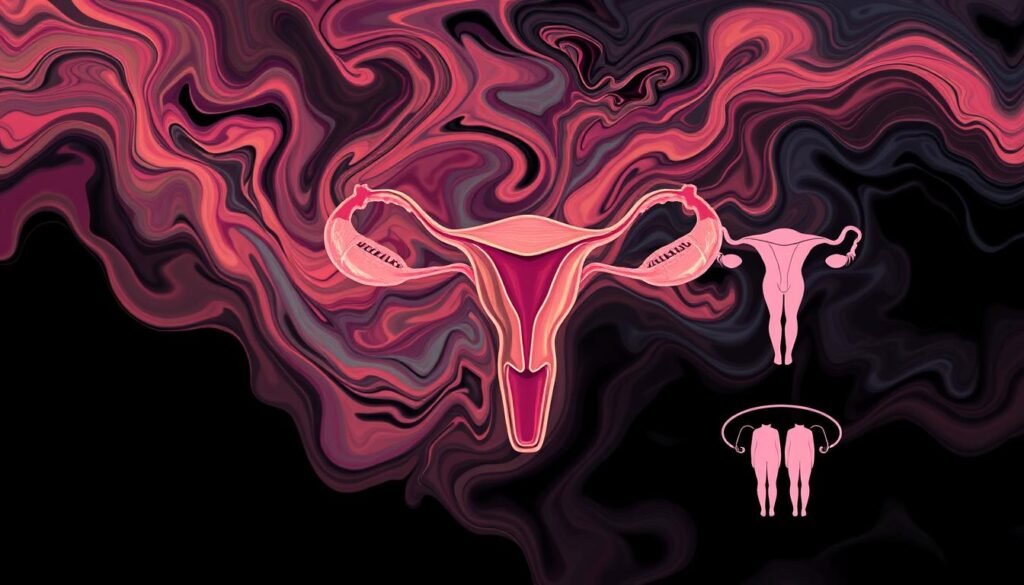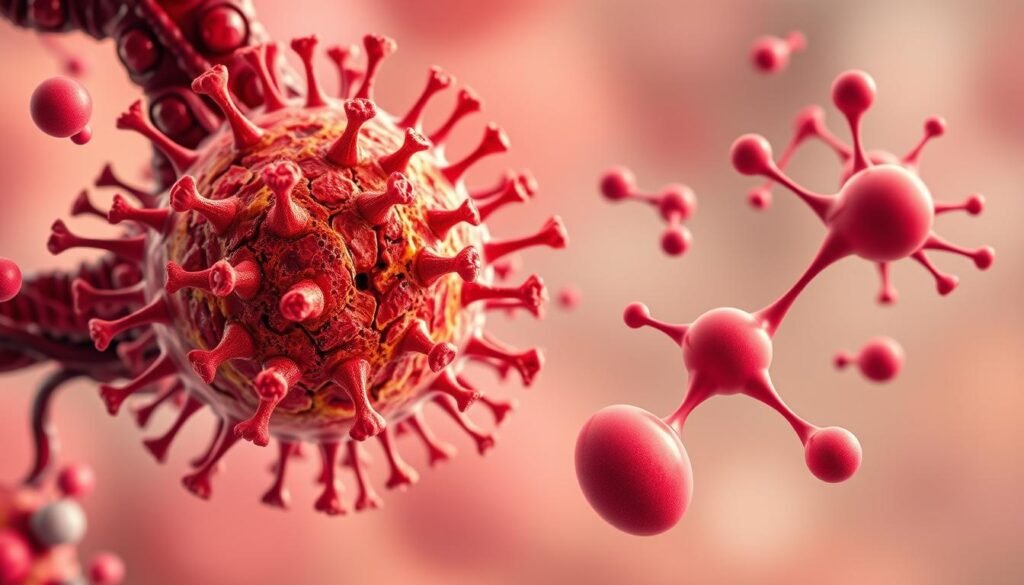About 1 in 10 women of childbearing age in the U.S. have Polycystic Ovary Syndrome (PCOS). This disorder messes up menstrual cycles and can lead to big health issues if not handled. Symptoms like irregular periods, too much hair growth, and gaining weight come from hormone problems. Many women with PCOS often deal with missed or heavy periods due to high levels of androgens and insulin.
It’s key to understand PCOS and how it changes menstrual health. It can mess with different parts of a woman’s life, from having a baby to risking diabetes and heart disease. Apart from fertility issues, PCOS can cause missed or heavy periods, too much hair, acne, and being overweight. Managing PCOS may mean changing your lifestyle, like eating healthy and exercising regularly. There are also medical treatments to balance hormones. For more info, check out this detailed resource or learn more at understanding PCOS.
In this article, you’ll learn why women with PCOS often have missed or heavy periods. You’ll understand the role of hormones and find ways to handle it. This information will help many take charge of their health and deal with PCOS’s challenges.
Key Takeaways
- PCOS affects 1 in 10 women of childbearing age, causing menstrual irregularities.
- High levels of androgens contribute to missed or heavy periods.
- Diagnosis often involves identifying at least two symptoms, including irregular menstrual cycles.
- Lifestyle changes such as diet and exercise are key in managing PCOS symptoms.
- Medical treatments like birth control pills can help regulate hormonal levels effectively.
Understanding PCOS and its Impact on Menstrual Cycles
Polycystic ovary syndrome (PCOS) affects up to 12% of U.S. women who can have babies. This disorder changes how hormones work, causing problems with periods. Learning about PCOS is key because it can make periods irregular.
Women with PCOS often face issues like missed periods and cycles that aren’t predictable. This happens because hormonal imbalances can stop ovulation, which you need for regular periods. Ovarian cysts, which form due to hormonal issues, make regulating periods even harder.
The impact on menstrual cycles goes beyond just being an inconvenience. Research shows PCOS is the main reason some women can’t conceive due to lack of ovulation. Also, women with this condition are more likely to have complications in pregnancy. This includes gestational diabetes and high blood pressure.
PCOS does not just affect reproductive health. It can cause higher insulin and glucose levels, raising the chance of getting type 2 diabetes and metabolic syndrome. There’s also a bigger risk of heart disease and endometrial cancer. This highlights why managing symptoms is so crucial.
In short, knowing about PCOS and how it disturbs menstrual cycles is important. It’s not just about irregular periods. PCOS can also lead to various health issues. Catching it early and managing it well helps improve life quality for those with the condition.
What Causes Missed Periods or Heavy Periods in PCOS?
Let’s dig into why women with Polycystic Ovary Syndrome (PCOS) often miss periods or have heavy flows. Hormonal balance and how the ovaries work are key areas to focus on. Hormonal issues and ovarian cysts are the main reasons for these irregularities.
Hormonal Imbalance and Menstrual Irregularities
Hormone issues play a big part in changing menstrual cycles for women with PCOS. They tend to have more androgens, a type of hormone, which messes up ovulation. This often leads to missed or late periods.
These hormone levels make it hard for the body to maintain a regular menstrual flow. This can cause very heavy periods in those with PCOS.
Role of Ovarian Cysts in Menstrual Changes
Ovarian cysts are another issue for women with PCOS affecting their cycles. These cysts, caused by hormone imbalances, block normal ovulation. This can make periods skip or be unpredictable.
Trying to manage these changes can result in too much bleeding or very long periods. Keeping track of menstrual changes is crucial. It helps women understand how hormone imbalances and cysts are affecting their periods. This knowledge guides them to seek the right help.

Find detailed advice on handling these hormone imbalances and their impact on your health here.
Common Symptoms of PCOS
Polycystic ovary syndrome (PCOS) has various symptoms that impact a woman’s health. Knowing these symptoms is key for early detection and management. Many women face irregular ovulation, causing missed or heavy periods. This issue often comes with other symptoms that affect self-esteem and mental health.
Irregular Ovulation and Its Effects
Irregular ovulation is a main sign of PCOS. It can cause menstrual problems and reproductive health issues. Women might have less than six to eight menstrual cycles a year. The unpredictability of irregular ovulation makes conceiving hard and can lead to more health problems.
Physical Manifestations: Hirsutism and Acne
PCOS also causes physical symptoms like hirsutism and acne. Hirsutism leads to too much hair growth in areas like the face and back. It happens due to hormonal imbalances from PCOS. Acne severity differs among people. Some deal with constant breakouts because of high androgen levels. Knowing these symptoms helps handle PCOS’s effects on women’s health.
| Symptom | Description |
|---|---|
| Irregular Ovulation | Infrequent or absent menstrual periods, leading to fertility challenges. |
| Hirsutism | Excess hair growth on the face, chest, and back, resulting from hormonal imbalance. |
| Acne | Persistent skin blemishes and breakouts due to elevated hormones. |
| Weight Gain | Difficulty managing weight, which further complicates symptoms. |
| Emotional Challenges | Higher likelihood of experiencing mood swings, anxiety, and depression. |
The Connection Between Insulin Resistance and PCOS
Insulin resistance affects hormonal balance and menstrual cycles in PCOS. Women with this issue often have high insulin levels. This can increase androgen production by the ovaries. The result? It complicates the menstrual cycle, leading to missed or heavy periods. Studies show 70% of women with PCOS are insulin resistant, underlining its impact on the condition.
How Insulin Resistance Affects Menstrual Cycles
Insulin resistance impacts more than just insulin levels. It’s linked with menstrual irregularities too. Research found a clear link, especially among women with absent or infrequent periods. Those with menstrual gaps over 90 days have even higher levels of insulin resistance. This proves a direct link between insulin resistance in PCOS and problems with menstrual cycles. High insulin disrupts ovarian function, harming menstrual health.
Impact of Weight Gain on Menstrual Health
Weight gain makes managing insulin resistance and menstrual cycles harder. Higher body mass index (BMI) can make insulin resistance worse. This worsens PCOS symptoms. When women gain weight, their menstrual issues often increase. This shows how weight and hormones are connected. It highlights the importance of focusing on lifestyle to better menstrual health.

| Condition | Percentage of Affected Women | HOMA-IR Levels |
|---|---|---|
| Normal Menstruation | 30% | 1.61 |
| Oligomenorrhea | 79.4% | 2.02 |
| Amenorrhea | 30%-40% | 2.35 |
It’s crucial to address insulin resistance and weight gain in PCOS. Understanding how these factors interconnect can help. This knowledge leads to better treatment and lifestyle changes. The goal is to improve reproductive health.
Examining Heavy Bleeding Associated with PCOS
Many people with PCOS have heavy bleeding as a key symptom. This is caused by hormonal imbalances affecting their menstrual cycle. The ovarian cysts and hormone level changes play a big role in this issue.
Causes of Heavy Bleeding in Affected Individuals
Several factors cause heavy bleeding in PCOS, including:
- Hormonal Imbalances: Changes in estrogen and progesterone levels can cause too much uterine lining to grow.
- Ovarian Cysts: These cysts mess with normal ovulation, leading to heavy and irregular periods.
- Insulin Resistance: This common issue in PCOS raises androgen levels, making menstrual problems worse.
To manage heavy bleeding well, knowing its specific causes is important. Getting checked by a doctor gives key information on the condition. A careful checkup tells apart heavy bleeding in PCOS from other menstrual issues.
Comparing Heavy Bleeding with Other Menstrual Abnormalities
It’s crucial to look at other conditions that might have similar symptoms when studying menstrual disorders:
| Condition | Characteristics | Diagnosis |
|---|---|---|
| Heavy Bleeding in PCOS | Heavy, irregular periods; tied to hormonal imbalances and cysts | Medical history, blood tests, ultrasound |
| Fibroids | Painful, heavy periods; may cause more pelvic pressure | Ultrasound, MRI |
| Endometriosis | Painful periods; heavy bleeding, often with pelvic pain | Laparoscopy, imaging tests |
Each of these conditions has its own diagnosis and treatment plan. A deep understanding of the causes of heavy bleeding helps doctors provide the right care.

Hormonal Changes and Their Impact on Periods
Hormonal changes in PCOS greatly alter reproductive health. Knowing how they affect symptoms helps manage the condition.
The Role of Androgens in PCOS Symptoms
PCOS sufferers often have high androgen levels. This leads to symptoms like irregular periods. High androgens disrupt egg release. This makes periods irregular or stops them. Androgens also cause problems like excessive hair and acne.
Understanding the Menstrual Cycle in PCOS Patients
It’s crucial to understand the menstrual cycle for PCOS management. A usual cycle has hormonal changes that control ovulation. But PCOS messes with these hormones. This causes long or unpredictable cycles. It can result in heavy or missed periods. Lifestyle changes and treatment can help balance hormones.
| Hormonal Changes | Impact on Menstrual Cycle |
|---|---|
| Elevated Androgens | Disruption of ovulation leading to irregular or missed periods |
| Estrogen Deficiency | Possible heavy menstrual bleeding if cycles occur |
| Insulin Resistance | May contribute to weight gain and further hormonal imbalances |
| Thyroid Hormone Levels | Hypothyroidism can cause heavy menstrual bleeding |
Understanding hormonal changes can improve treatment for affected women. For more info, see the World Health Organization. They have PCOS management tips.
Diagnosing PCOS: What to Expect
When diagnosing PCOS, doctors focus on your symptoms and medical history first. They look for issues like missed periods, too much hair growth, and acne. These are key signs of PCOS.
Evaluation of Symptoms and Medical History
A doctor will ask about your menstrual cycle during the first visit. They’ll want to know:
- How often you have periods
- How heavy and long they are
- Any missed periods or irregular cycles
Talking about your family’s health and any past issues helps too. This thorough check helps spot patterns that point to PCOS.
Diagnostic Tests: Ultrasounds and Blood Work
With symptoms reviewed, doctors may suggest tests to confirm PCOS. These tests include:
| Test | Purpose |
|---|---|
| Pelvic Ultrasound | Checks for polycystic ovaries |
| Blood Tests | Looks at hormone levels and checks for insulin resistance |
Diagnostic tests help exclude other conditions. They make sure the treatment plan fits your needs.
Managing PCOS and Regulating Menstrual Cycles
Polycystic ovary syndrome (PCOS) is a common issue for many women in the U.S. It’s important to know how to manage it and keep menstrual cycles regular. By making certain lifestyle changes, women can better their symptoms and overall health. Eating right and exercising regularly helps control weight and improve insulin levels, which benefits hormonal balance.
Lifestyle Changes: Diet and Exercise
Making lifestyle changes is key for people with PCOS. Keeping a healthy weight matters a lot, as about 80 percent of women with PCOS are overweight. Eating foods that are good for you helps lessen inflammation and keeps blood sugar in check. Adding exercise to your daily routine can also help make menstrual cycles more regular. This can ease symptoms like heavy or irregular periods.
Medical Treatments for Hormonal Imbalance
Besides lifestyle changes, some women might need medicine to help with PCOS hormonal issues. Doctors often suggest birth control pills to help make periods more regular. There are also drugs to deal with symptoms like too much hair and acne. Plus, medicine like metformin can help control insulin. This could lead to more consistent menstrual cycles and better fertility health.